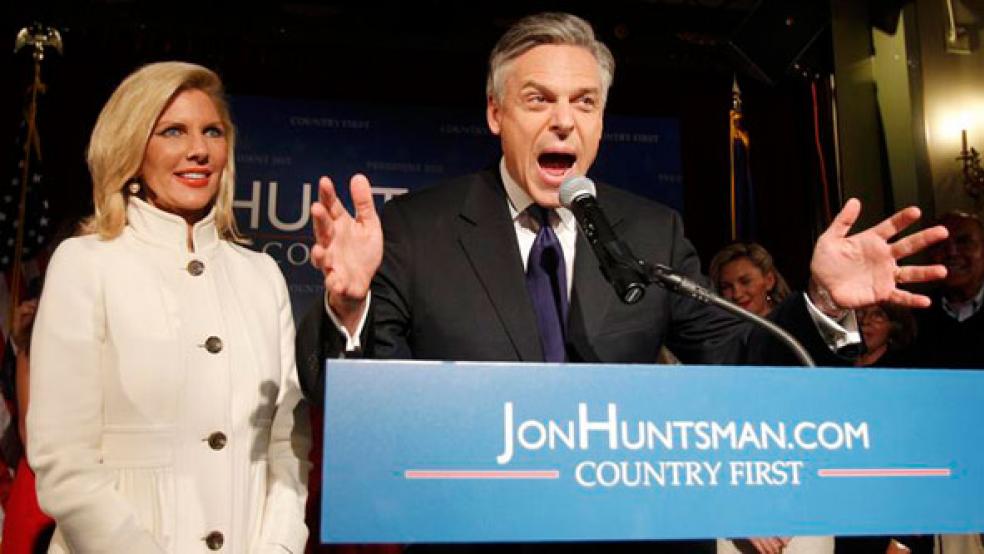As the Republican presidential campaigns view their rear-view mirrors as they leave New Hampshire, at least one campaign still has to answer the fundamental question of what it ever hoped to accomplish. Two campaigns explicitly rested their primary strategy on winning the Granite State, and Mitt Romney certainly met expectations. He pulled in nearly 40 percent of the vote and became the first non-incumbent to win both Iowa and New Hampshire in decades. The Romney campaign now has a head of steam rolling into South Carolina, and a win there might make a good argument for the rest of the field to capitulate.
On the other end of the spectrum, we find Jon Huntsman’s campaign, perhaps this cycle’s most puzzling of the major efforts in the Republican primary. On paper, Huntsman appears to be a formidable competitor among Republicans and even conservatives. Huntsman had a strong record of success as governor of Utah, perhaps the most conservative state in the nation. He alone embraced without reservation the budget and entitlement-reform plan of Tea Party favorite Paul Ryan. Also alone among the GOP candidates, Huntsman had both executive experience and formal foreign-policy credentials, thanks to his time as a deputy trade representative in the George W. Bush administration and two years as Ambassador to China under Barack Obama.
However, Huntsman never connected to the Republican base, for a number of reasons. Conservatives, especially in the Tea Party, didn’t extend much trust to a man who showered praise on President Obama as a “remarkable leader” with “brilliant analysis of world events,” and Secretary of State Hillary Clinton as having “even more charisma than her husband!” Nor did the manner of his leaving impress Republicans, having made it known that he wanted to challenge his boss for the White House before officially resigning from his post in the administration.
This came from an effort to paint himself as a moderate, even though he established a flat tax, banned second-trimester abortions, and made late-term abortions a felony.
If Tea Party conservatives didn’t warm to Huntsman, the feeling was undeniably mutual. Earlier this week, Huntsman told Politico that he hoped that the cycles of political thought “ultimately takes us to a sane Republican Party based on real ideas,” after supposedly “losing its equilibrium” in the Obama era. Two weeks earlier, while the rest of the field competed in the Iowa caucuses – a battleground state that will be important to Republican hopes in the fall – Huntsman sneered, “They pick corn in Iowa, and pick presidents here in New Hampshire.” This did not come from a momentary frustration with his low position in national polls, but a months-long effort to paint himself as a reasoned moderate in a field full of ideologues, even though his record as governor of Utah included the establishment of a flat tax, banning second-trimester abortions, and making late-term abortions a felony.
Furthermore, Huntsman turned out to be rather poor at hiding this disdain in the most closely watched events of the campaigns – the televised debates. The former diplomat displayed clumsiness in presenting himself that tended to make Mitt Romney look suave and relaxed by comparison. Huntsman insisted on delivering smug one-liners that invariably fell flat, leaving the uncomfortable impression that Huntsman had convinced himself against all evidence that he was funny, as well as the smartest guy in the room. In the final debate, Huntsman scolded Romney’s criticism of his time in the Obama administration by offering the novel argument that agreeing to take an ambassadorship was equivalent to his sons’ military service, not once but twice – and then campaigned on the idea in the last couple of days.
Huntsman never really articulated a reason why only Huntsman could successfully represent the Republican Party in the next presidential election
Huntsman gambled that he could attract New Hampshire moderates and independents with his campaign style and convince conservatives on his record, and ride that coalition to a victory in New Hampshire, even though Mitt Romney had campaigned heavily in the Granite State and lived in the state part time. He lost that gamble, and didn’t come close, finishing a distant third to Romney and Ron Paul. According to exit polls, Huntsman only won a handful of demographics in New Hampshire: Democrats, those who oppose the Tea Party, and voters who are generally satisfied with the Obama administration.
With that in mind, perhaps the strangest decision from the Huntsman campaign is to proceed to more sharply conservative South Carolina. At least in New Hampshire, a moderate candidate can count on a large turnout of independents in a Republican primary. Exit polls showed that 47 percent of the turnout on Tuesday came from unaffiliated voters, among which Huntsman finished only third, behind Ron Paul and Mitt Romney. While South Carolina has an open primary, independents accounted for only 18 percent of the vote in the 2008 Republican primary, and only 23 percent of the Democratic primary. The next state, Florida, holds a closed primary in which only registered Republicans can vote, and among Republicans in New Hampshire, Huntsman finished fifth with just 10 percent of the vote.
The big question for the Huntsman campaign all along has been why. Huntsman never really articulated a reason why only Huntsman could successfully represent the Republican Party in the next presidential election. He never explained why he bypassed Iowa, which is arguably culturally and politically closer to Utah than New Hampshire, and decided to roll the dice on a state that Romney had locked up long ago. Now, with his campaign only connecting to people outside of the Republican Party who don’t particularly feel the need for a change of course, Huntsman needs to explain why he thinks that his curious coalition gives him any argument for victory in a conservative Southern state and a closed Republican primary in a state that elected Marco Rubio in 2010. Perhaps someone can tell Huntsman to wake up and smell the coffee in Mandarin.





